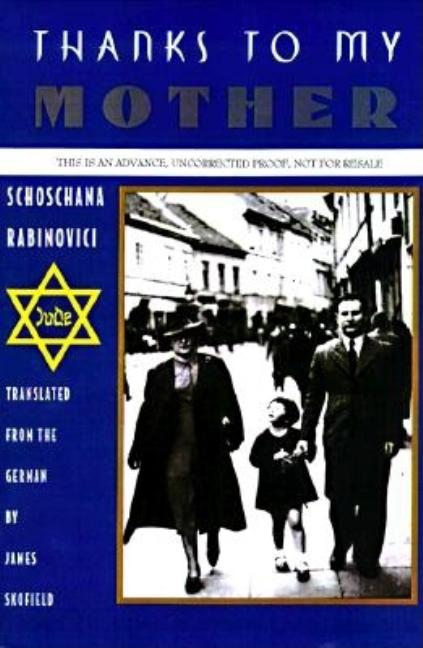Book Descriptions
for Thanks to My Mother by Schoschana Rabinovici
From Cooperative Children's Book Center (CCBC)
"On June 22, 1941, I saw my father for the last time." These stark, striking words begin an amazing story of strength and survival in this Holocaust memoir. Soschana Rabinovici was born Susanne Weksler in 1932. In 1941, the Germans invaded her Lithuanian homeland. At first Susie and her mother and other relatives move into her grandparents house, where they hear frightening stories of Jews around the city being rounded up and taken away. But it's not long before they are forced into the Vilnius ghetto with thousands of other Jews, where the days are marked by mounting fear and growing horror despite the heroic efforts of the Jewish resistance. In 1943, the ghetto was liquidated, and Susie, her mother and her older sister are placed on a transport train heading to the camps. Over the next three years, Susie's mother saves her daughter over and over again through her ingenuity and fearlessness as they are moved from one cruel camp to another, and then forced on a brutal death march in the winter of 1945. In the end, Susie saves her mother, too, by infusing her with a will to live after they are liberated and her mother's sick body and weary mind cannot go on. The vivid imagery of this memoir is intense and striking--there is such immediacy in the writing that one feels the panic of suffocation in the cattle cars, the hopeless resignation of those who no longer had the will to fight. Some of these individuals surrendered to certain death by the simple act of refusing to stand up or move, fully aware of what they were doing as the guards took aim. Susie's stepsister is one of those she witnesses committing this traumatic but understandable form of escape. Beneath it all there is aching pain, and the fierce determination of Susie's mother to keep her daughter alive. Winner, 1998 CCBC Batchelder Discussion. (Age 13 and older)
CCBC Choices 1998. © Cooperative Children's Book Center, Univ. of Wisconsin - Madison, 1998. Used with permission.
From the Publisher
Susie Weksler was only eight when Hitler's forces invaded her Lithuanian city of Vilnius. Over the next few years, she endured starvation, brutality, and forced labor in three concentration camps. With courage and ingenuity, Susie's mother helped her to survive--by disguising her as an adult to fool the camp guards, finding food to add to their scarce rations, and giving her the will to endure. This harrowing memoir portrays the best and worst of humanity in heartbreaking scenes you will never forget.
Winner of the Mildred L. Batchelder Award
An ALA Notable Book
An NCSS-CBC Notable Children's Trade Book in the Field of Social Studies
Winner of the Mildred L. Batchelder Award
An ALA Notable Book
An NCSS-CBC Notable Children's Trade Book in the Field of Social Studies
Publisher description retrieved from Google Books.


